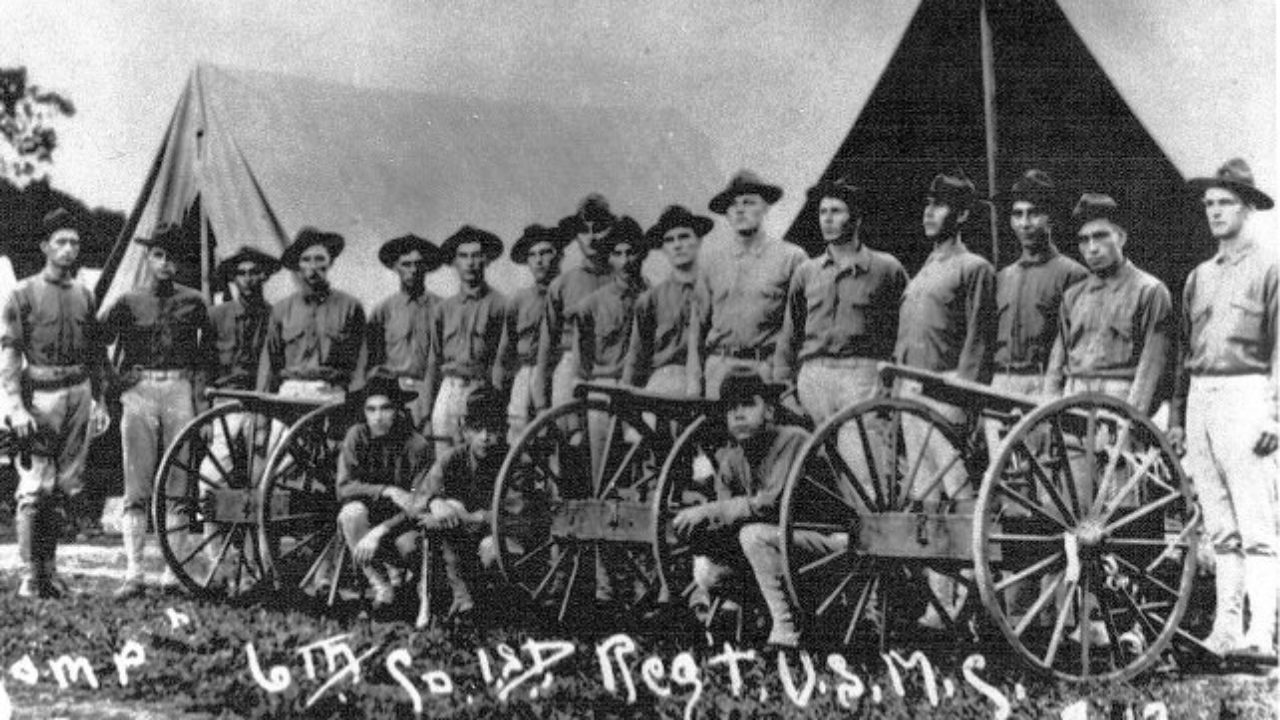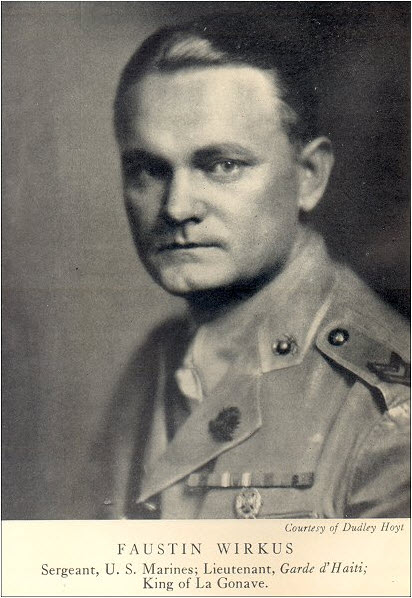Faustin Wirkus – The US Marine who became a king
- By Travis Pike
Share This Article

Did you know a Marine once became the king of a small island in Haiti? Yep, Marines often claim that they can do anything, and it seems like a man Faustin Wirkus took it a step beyond. His story is fascinating, as was his Marine Corps career.
Faustin’s place of birth has been disputed. According to his official biography, he was born in 1896 in a small town in eastern Prussia, in what’s now Poland. According to State Department records from ship passenger lists, he was born in Pennsylvania. Regardless, he settled in Dupont, Pennsylvania, and was born and raised in the shadow of coal mines.
As you’d imagine being a coal miner in the early 1900s doesn’t seem too appealing. Faustin decided at a young age that he would become a Marine and escape from a life of coal mining. So, in 1915 Faustin Wirkus signed the dotted line and became a United States Marine.
That same year he saw deployment to Haiti and was seemingly excited at the prospect.
Haiti and Faustin Wirkus

In 1915 President Woodrow Wilson sent Marines to Haiti as the island had become increasingly unstable. Virbum Guillaume Sam had seized power as the president of Haiti and then murdered over 150 political prisoners. The people of Haiti, however, seized Sam and hung him for his crimes. Predictably the country was on the verge of full-blown instability.
America had an interest in Haiti for four reasons: First, it feared the murder of American citizens in Haiti. Second, it owned a large portion of Haiti’s debt. Third, it feared German influence in Haiti; and fourth American business interest in Haiti was at risk. Thus, the Marines landed and clashed with local forces who resisted the occupation.
Faustin served for a year at Port-au-Prince but was sent home when his arm suffered a compound fracture. After recuperating, he went to Cuba, but in 1919 returned to Haiti.
In the same year, he became a sergeant and later a lieutenant in the Garde d’Haiti. The Garde d’Haiti was a local paramilitary force made of U.S. advisors and Haitian forces. By 1920 he had also become a gunnery sergeant in the Marine Corps. The promotions in two military forces show that his six years of service were exemplary.

After six years of service in Haiti, he was assigned to be the La Gonave resident commander. La Gonave is a 287-square-mile island 50 miles from Port-au-Prince. It was home to 12,000, and communication between La Gonave and mainland Haiti was infrequent at best.
Born to be a king

According to a Time article from 1931, Faustin Wirkus liked black people. The article states:
“Not many white men really like black men. But Faustin Wirkus, lately of the U. S. Marines stationed in Haiti, likes them…”
In 1919 this was quite progressive, and it likely made it easy for him to become well-liked among the people of La Gonave. La Gonave didn’t mimic the culture of modern Haiti and was more or less ruled by a series of queens and sub-queens. Faustin Wirkus became greatly liked by the people of La Gonave.
According to that 1931 Time article, Wirkus gained the confidence of Queen of Queens Ti Memenne due to his efforts to make life on the island better. When he discovered that a group of grifting tax collectors was being abusive he had them removed and used the men under his command to collect taxes. He employed the unemployed and became the island’s judge, lighthouse keeper, sanitary inspector, census taker, and doctor.
He attended Haitian religious ceremonies when invited, acted as a midwife once, and kept bandits at bay. He was able to get a doctor to come to the island to help with children’s needs and expectant mothers. By all accounts, Faustin Wirkus served the Haitian people and acted fairly as the commander of La Gonave.
Related: Battle priests – These are the 5 most famous holy men at war
How one becomes king
There seem to be two stories about how Faustin Wirkus became King. One involves him saving the queen, although that particular tale seems a little far-fetched.
But according to his autobiography, he became the King of La Gonave without even knowing it: One day, he attended a ceremony with the local people, something he had done before. It was July 18th, 1926. Here the blood of a chicken was smeared on him, and the ceremony ended with him being the King of La Gonave. Queen Ti Memenne had the ladies of the society curtsy to him, and the men remove their hats. Faustin later commented,
“They made me a sort of king in a ceremony I thought was just a celebration of some kind. I learned later they thought I was the reincarnation of a former king of the island who had taken the name of Faustin I when he came into power. The coincidence was just good luck for me.”
Indeed, from 1849 to 1859, the Emperor of Haiti was Faustin Soulouque. He was apparently a cruel king and used violence to deter opposition.
So, it seems that in a mix of what was likely appreciation and odd coincidence, Queen Ti Memene made Faustin Wirkus a king.
Faustin Wirkus’s rule raises eyebrows

Faustin Wirkus now served as a gunnery sergeant, lieutenant, and king. As king, he oversaw the construction of a wharf and became even more popular among the people. (Yet, when you read between the lines, it seemed more of an honorary title, almost a joke between the people of La Gonave and Wirkus.)
President Louis Borno didn’t take the White King of Haiti as a joke. He visited the island in 1928 and somewhat rightly disliked the idea of a seemingly unelected, foreign occupier taking the title of king in a country that was under occupation.
Time recorded President Borno’s words as, “Haiti is a republic. I am its president. It is unthinkable that there should be a kingdom within a republic or a ‘king.'” After that, Faustin Wirkus was sent back to the United States, no longer a king.
Leaving La Gonave
Faustin Wirkus left Haiti, and I imagine he was somewhat sad to do so as he seemed to like his posting and the Haitian people.
He left the Marine Corps in 1931 but came back in 1939 as a recruiting specialist and became a warrant officer. He later worked as an aviation gunnery instructor.
Sadly, Faustin passed away in 1945 at the age of 48. His final resting place is in Arlington National Cemetery.
Read more from Sandboxx News
Related Posts
Sandboxx News Merch
-

‘AirPower’ Classic Hoodie
$46.00 – $48.00 Select options This product has multiple variants. The options may be chosen on the product page -

‘Sandboxx News’ Trucker Cap
$27.00 Select options This product has multiple variants. The options may be chosen on the product page -

F-35 ‘Lightning’ Framed Poster
$45.00 – $111.00 Select options This product has multiple variants. The options may be chosen on the product page

Travis Pike
Travis Pike is a former Marine Machine gunner who served with 2nd Bn 2nd Marines for 5 years. He deployed in 2009 to Afghanistan and again in 2011 with the 22nd MEU(SOC) during a record-setting 11 months at sea. He’s trained with the Romanian Army, the Spanish Marines, the Emirate Marines, and the Afghan National Army. He serves as an NRA certified pistol instructor and teaches concealed carry classes.
Related to: Military History

The HK MK23 built for SOCOM was the first and last offensive handgun

The slick custom shotgun carried by a Navy SEAL point man in Vietnam
Sandboxx News
-

‘Sandboxx News’ Trucker Cap
$27.00 Select options This product has multiple variants. The options may be chosen on the product page -

‘AirPower’ Classic Hoodie
$46.00 – $48.00 Select options This product has multiple variants. The options may be chosen on the product page -

‘AirPower’ Golf Rope Hat
$31.00 Select options This product has multiple variants. The options may be chosen on the product page -

‘Sandboxx News’ Dad Hat
$27.00 Select options This product has multiple variants. The options may be chosen on the product page
